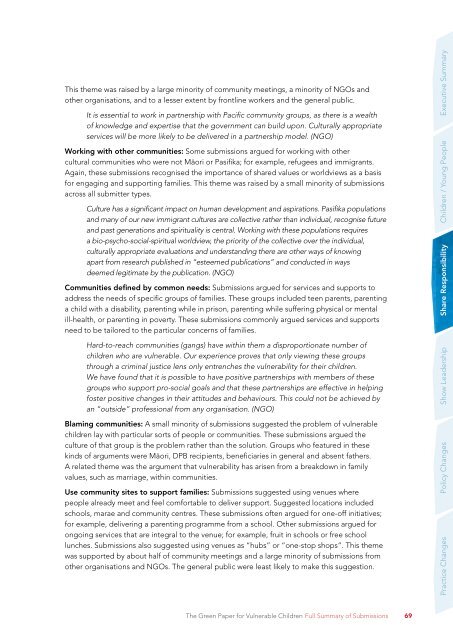The Green Paper for Vulnerable Children - Ministry of Social ...
The Green Paper for Vulnerable Children - Ministry of Social ...
The Green Paper for Vulnerable Children - Ministry of Social ...
You also want an ePaper? Increase the reach of your titles
YUMPU automatically turns print PDFs into web optimized ePapers that Google loves.
This theme was raised by a large minority <strong>of</strong> community meetings, a minority <strong>of</strong> NGOs andother organisations, and to a lesser extent by frontline workers and the general public.It is essential to work in partnership with Pacific community groups, as there is a wealth<strong>of</strong> knowledge and expertise that the government can build upon. Culturally appropriateservices will be more likely to be delivered in a partnership model. (NGO)Working with other communities: Some submissions argued <strong>for</strong> working with othercultural communities who were not Māori or Pasifika; <strong>for</strong> example, refugees and immigrants.Again, these submissions recognised the importance <strong>of</strong> shared values or worldviews as a basis<strong>for</strong> engaging and supporting families. This theme was raised by a small minority <strong>of</strong> submissionsacross all submitter types.Culture has a significant impact on human development and aspirations. Pasifika populationsand many <strong>of</strong> our new immigrant cultures are collective rather than individual, recognise futureand past generations and spirituality is central. Working with these populations requiresa bio-psycho-social-spiritual worldview, the priority <strong>of</strong> the collective over the individual,culturally appropriate evaluations and understanding there are other ways <strong>of</strong> knowingapart from research published in “esteemed publications” and conducted in waysdeemed legitimate by the publication. (NGO)Communities defined by common needs: Submissions argued <strong>for</strong> services and supports toaddress the needs <strong>of</strong> specific groups <strong>of</strong> families. <strong>The</strong>se groups included teen parents, parentinga child with a disability, parenting while in prison, parenting while suffering physical or mentalill-health, or parenting in poverty. <strong>The</strong>se submissions commonly argued services and supportsneed to be tailored to the particular concerns <strong>of</strong> families.Hard-to-reach communities (gangs) have within them a disproportionate number <strong>of</strong>children who are vulnerable. Our experience proves that only viewing these groupsthrough a criminal justice lens only entrenches the vulnerability <strong>for</strong> their children.We have found that it is possible to have positive partnerships with members <strong>of</strong> thesegroups who support pro-social goals and that these partnerships are effective in helpingfoster positive changes in their attitudes and behaviours. This could not be achieved byan “outside” pr<strong>of</strong>essional from any organisation. (NGO)Blaming communities: A small minority <strong>of</strong> submissions suggested the problem <strong>of</strong> vulnerablechildren lay with particular sorts <strong>of</strong> people or communities. <strong>The</strong>se submissions argued theculture <strong>of</strong> that group is the problem rather than the solution. Groups who featured in thesekinds <strong>of</strong> arguments were Māori, DPB recipients, beneficiaries in general and absent fathers.A related theme was the argument that vulnerability has arisen from a breakdown in familyvalues, such as marriage, within communities.Use community sites to support families: Submissions suggested using venues wherepeople already meet and feel com<strong>for</strong>table to deliver support. Suggested locations includedschools, marae and community centres. <strong>The</strong>se submissions <strong>of</strong>ten argued <strong>for</strong> one-<strong>of</strong>f initiatives;<strong>for</strong> example, delivering a parenting programme from a school. Other submissions argued <strong>for</strong>ongoing services that are integral to the venue; <strong>for</strong> example, fruit in schools or free schoollunches. Submissions also suggested using venues as “hubs” or “one-stop shops”. This themewas supported by about half <strong>of</strong> community meetings and a large minority <strong>of</strong> submissions fromother organisations and NGOs. <strong>The</strong> general public were least likely to make this suggestion.Practice Changes Policy Changes Show Leadership Share Responsibility <strong>Children</strong> / Young People Executive Summary<strong>The</strong> <strong>Green</strong> <strong>Paper</strong> <strong>for</strong> <strong>Vulnerable</strong> <strong>Children</strong> Full Summary <strong>of</strong> Submissions69
















